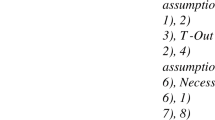Abstract
In recent years there has been a growing consensus that ordinary reasoning does not conform to the laws of classical logic, but is rather nonmonotonic in the sense that conclusions previously drawn may well be removed upon acquiring further information. Even so, rational belief formation has up to now been modelled as conforming to some fundamental principles that are classically valid. The counterexample described in this paper suggests that a number of the most cherished of these principles should not be regarded as valid for commonsense reasoning. An explanation of this puzzling failure is given, arguing that a problem in the theory of rational choice transfers to the realm of belief formation.
Similar content being viewed by others
REFERENCES
Alchourrón, Carlos, Peter Gärdenfors and David Makinson: 1985, ‘On the Logic of Theory Change: Partial Meet Contraction Functions and Their Associated Revision Functions’, Journal of Symbolic Logic 50, 510–530.
Brewka, Gerd: 1991, ‘Cumulative Default Logic: In Defense of Non-Monotonic Inference Rules’, Artificial Intelligence 50, 183–205.
Dennett, Daniel: 1971, ‘Intentional Systems’, Journal of Philosophy 68, 87–106. The page reference is to the reprint in D.D.: 1978, Brainstorms, MIT Press, Cambridge, MA, pp. 3-22
Gärdenfors, Peter: 1986, ‘Belief Revisions and the Ramsey Test for Conditionals’, Philosophical Review 95, 81–93.
Gärdenfors, Peter: 1988, Knowledge in Flux. Modeling the Dynamics of Epistemic States, Bradford Books, MIT Press, Cambridge, MA.
Gärdenfors, Peter and Hans Rott: 1995, ‘Belief Revision’, in D. M. Gabbay, C. J. Hogger, and J. A. Robinson (eds.), Handbook of Logic in Artificial Intelligence and Logic Programming Volume IV: Epistemic and Temporal Reasoning, Oxford University Press, Oxford, pp. 35–132.
Giordano, Laura and Alberto Martelli: 1994, ‘On Cumulative Default Logics’, Artificial Intelligence 66, 161–179.
Hansson, Sven O.: 1999, A Textbook of Belief Dynamics: Theory Change and Database Updating, Kluwer Academic Publishers, Dordrecht.
Kalai, Gil, Ariel Rubinstein, and Ran Spiegler: 2002, ‘Rationalizing Choice Functions by Multiple Rationales’, Econometrica 70, 2481–2488.
Kyburg, Henry E., Jr.: 2001, ‘Real Logic is Nonmonotonic’, Minds and Machines 11, 577–595.
Levi, Isaac: 1986, Hard Choices, Cambridge University Press, Cambridge.
Lindström, Sten: 1991, ‘A Semantic Approach to Nonmonotonic Reasoning: Inference Operations and Choice’, Uppsala Prints and Preprints in Philosophy, Department of Philosophy, University of Uppsala.
Lindström, Sten and Wlodek Rabinowicz: 1999, ‘DDL Unlimited: Dynamic Doxastic Logic for Introspective Agents’, Erkenntnis 50, 353–385.
Luce, R. Duncan and Howard Raiffa: 1957, Games and Decisions, John Wiley & Sons, New York.
Makinson, David: 1994, ‘General Patterns in Nonmonotonic Reasoning’, in D. M. Gabbay, C. J. Hogger, and J. A. Robinson (eds.), Handbook of Logic in Artificial Intelligence and Logic Programming,Vol. 3: Nonmonotonic Reasoning and Uncertain Reasoning, Oxford University Press, Oxford, pp. 35–110.
Makinson, David and Peter Gärdenfors: 1991, ‘Relations between the Logic of Theory Change and Nonmonotonic Logic’, in A. Fuhrmann and M. Morreau (eds.), The Logic of Theory Change, Springer LNAI 465, Berlin, pp. 185–205.
McGee, Van: 1985, ‘A Counterexample toModus Ponens’, Journal of Philosophy 82, 462–471.
Morgan, Charles G.: 2000, ‘The Nature of Nonmonotonic Reasoning’, Minds and Machines 10, 321–360.
Moulin, Hervé: 1985, ‘Choice Functions over a Finite Set: A Summary’, Social Choice and Welfare 2, 147–160.
Reiter, Raymond: 1980, ‘A Logic of Default Reasoning’, Artificial Intelligence 13, 81–132.
Roos, Nico: 1998, ‘Reasoning by Cases in Default Logic’, Artificial Intelligence 99, 165–183.
Rott, Hans: 1989, ‘Conditionals and Theory Change: Revisions, Expansions, and Additions’, Synthese 81, 91–113.
Rott, Hans: 1993, ‘Belief Contraction in the Context of the General Theory of Rational Choice’, Journal of Symbolic Logic 58, 1426–1450.
Rott, Hans: 2001, Change, Choice and Inference, Oxford Logic Guides, Vol. 42, Clarendon Press, Oxford.
Sen, Amartya K.: 1993, ‘Internal Consistency of Choice’, Econometrica 61, 495–521.
Sen, Amartya K.: 1995, ‘Is the Idea of Purely Internal Consistency of Choice Bizarre?’, in J. E. J. Altham and R. Harrison (eds.), World, Mind, and Ethics. Essays on the Ethical Philosophy of Bernard Williams, Cambridge University Press, Cambridge, pp. 19–31.
Stalnaker, Robert C.: 1984, Inquiry, Bradford Books, MIT Press, Cambridge, MA.
Author information
Authors and Affiliations
Rights and permissions
About this article
Cite this article
Rott, H. A Counterexample to Six Fundamental Principles of Belief Formation. Synthese 139, 225–240 (2004). https://doi.org/10.1023/B:SYNT.0000024914.61925.5b
Issue Date:
DOI: https://doi.org/10.1023/B:SYNT.0000024914.61925.5b




